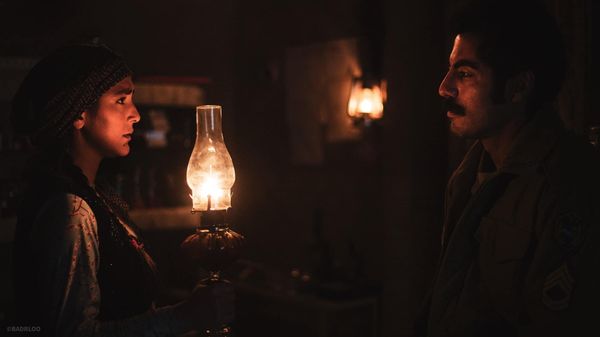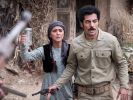Eye For Film >> Movies >> Zalava (2021) Film Review
Zalava
Reviewed by: Jennie Kermode

Set in the late Seventies in an Iran on the brink of giving way to religious fundamentalism, Arsalan Amiri’s Zalava presents a scenario which functions like a microcosm of the forces at work, and whose release seems timely now as other parts of the world are threatened by the mass rejection of reason in favour of simpler apparent solutions. It follows the sergeant of the local gendarmerie, city-born Massoud (Navid Pourfaraj), as he attempts to disabuse residents of the titular village of the notion that demons are taking possession of people and livestock.
If this sounds like a trivial exercise, consider this: when a person is thought to be possessed, the treatment involves shooting them in the legs so that they bleed heavily and the demon will be flushed out of the body. This isn’t inhumane – it is thought to be the only way of saving such a person, and the aim is to intervene before they actually dies, though of course that’s far from guaranteed. The risk is exacerbated by the fact that Zalava is high up in the mountains, far from the nearest hospital. The only medical help comes from Maliheh (Hoda Zeinolabedin), a doctor who set up practice there to study a disfiguring genetic illness common in the region, but who tries to help the local people and gradually persuade them to engage with modern medicine.

With no other educated people to talk to (Massoud’s colleagues have been through the school system but are not the type to have won class prizes), Massoud and Malileh have formed a strong bond. He would like to take it further but worries about endangering their friendship. She’s fully focused on her patients and content to let him take his time, though she’s quick to take him aside when she feels that he’s struggling to grasp the psychology of the local people.
One person who understands that very well is professional exorcist Amardan (Pouria Rahimi Sam), and it’s his arrival in the village which catalyses everything, so that Massoud’s social clumsiness and naivety (which he puts down to having grown up in an orphanage) becomes a serious liability. Amardan travels from village to village driving out demons, lifting curses and the like. The Zalavians see him as their saviour. Massoud sees him as a charlatan. How he sees himself is not entirely clear. Indeed, one of the key notions in Amiri’s film is that we are all of us capable of holding two or more contradictory positions at once. Understanding something rationally doesn’t automatically equate to feeling sure of it emotionally.
It’s by tugging on those emotional strings, teasing out those nagging doubts, that Amiri drives the film forwards. When Amardan claims to have captured a demon inside a glass jar, the jar becomes the focus of everyone’s attention. At the gendarmerie, an adopted cat hisses at it, then rolls it around. There’s nothing in it but smoke, Massoud insists, and yet he’s nervous, and the viewer will be too. No matter how one tries to rationalise it, the question remains: what if the exorcist is telling the truth? Perhaps it seems more reasonable to ask that question about a film, where rules are not to be taken for granted, but life in remote places like Zalava can feel similarly uncertain.
Pourfaraj is superb in the lead, his Massoud stiff-backed, primly moustached, yet achingly human. As he seeks to champion reason, he is also struggling to come to terms with his own irrational yet vital impulses. Whilst Amiri builds real terror around that glass jar, Massoud’s greater fear stems from his gradual realisation that being reasonable, and well intentioned, and right, means absolutely nothing to the people around him, and will not save anyone if it runs against the tide of their belief. Tragedy is coming, and a merciful God has never felt further away.
Reviewed on: 17 Mar 2022















